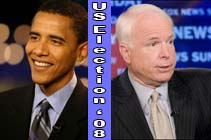Generational war in Florida over Obama and McCain
 Miami - As if it were a generational war, Florida's Cuban- Americans are divided by age over centre-left Democrat Barack Obama and centre-right Republican John McCain for the White House.
Miami - As if it were a generational war, Florida's Cuban- Americans are divided by age over centre-left Democrat Barack Obama and centre-right Republican John McCain for the White House.
As in earlier elections, particularly the controversial vote in 2000 when the country was left hanging for weeks like so many ballot chads, Florida is likely to play a key role on November 4.
The state grants 27 electoral votes to the winner, a full 10 per cent of the 270 needed nationwide to be president and the fourth largest number of the 50 states after California, Texas and New York.
In the polls, Obama shows a surprising lead here, strengthened by the ongoing financial crisis, the drop in stock prices, the rise in unemployment and the fall in the purchasing power of US citizens.
However, Cuban-Americans - traditionally loyal to the Republican Party and conservative in their political ideals - may again hold the key to the election.
According to the Institute for Cuban and Cuban-American Studies (ICCAS) at the University of Miami, 68.5 per cent of the Cuban- American electorate identify themselves as Republican, 16.2 per cent as independent and 15.3 as Democrat.
Even so, young people who intend to vote in Florida differ from their elders in their approach to the vital issues: relations with Cuba, the national economy, the war in Iraq, the health system and education.
Cubans who arrived in Florida in the 1960s and 1970s favour McCain as they once favoured President George W Bush. The Arizona senator has signalled he'll keep the hardline policies of strict embargoes, restrictions on travel and remittances to Cuba.
The oldest Cuban-Americans - many of them over 60 - have been busy in recent weeks, carrying banners, making phone calls, sending emails and visiting people who need help going to the polls.
"We cannot lose a single vote," Luis Mangas told a local television channel.
Mangas, 76, who is now a pensioner, arrived from Cuba in 1965 and worked for an insurance company in Miami-Dade County.
"There is a lot at stake for this city and for the future of Cuba," he said with evident passion.
"Obama has said he would sit down to talk with the Castro brothers, Hugo Chavez and Iranian (President Mahmoud) Ahmadinejad. Doesn't that mean legitimizing dictators?" Mangas asked.
However, young people aged 18-25, the children of Cubans or Cuban- Americans born in the US, have a different vision for their future.
Many think that the US strategy to democratize Cuba is not as vital as the pressing economic problems, including credit to buy homes or cars and access to credit cards, which do affect them directly.
With roots in the world's largest consumer society, the new generation has suffered significant blows to their comfortable lifestyle in recent years, which they attribute to the decisions made by the Bush administration.
"The country is going down an economic tube that can be irreversible," Alex Bermudez told a local radio station.
"We have to regain confidence and return to the levels of the year 2000, when the country was flourishing," he said.
Bermudez, a 19-year-old student who is the grandson of a Cuban and a Puerto Rican, defines himself as an independent. He thinks Obama "brings fresh blood and the change that the United States needs." As for the war in Iraq, he believes "it was a mistake."
"Now we do not know what to do to get out of there. But the truth is it is costing billions of dollars a year to the American taxpayer," he complained.
Florida's social dynamics have changed over the years, with more younger voters flooding the rolls. According to Census Bureau statistics, the number of Cubans entitled to vote in Miami-Dade grew to almost 795,000 in 2007, about 144,000 more than in 2000.
Only one in eight Cuban-American voters migrated after 1980. Yet the hundreds of thousands of newly arrived who have left behind wives, children, parents, grandparents and other relatives on the communist island favour reduction of restrictive measures on the government in Havana and want to be able to send more remittances back, or even travel to their home country.
Their votes tend to favour Obama, while those who still do not have the right to vote yet staunchly stand up for those they left behind.
"There are many contrasts, and we are certainly going to see a very different election to earlier ones," said Andy Gomez, a researcher at the University of Miami.
"Florida will hold a very important key," he stressed. (dpa)